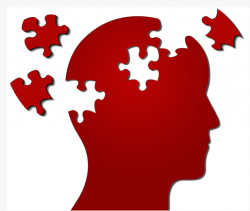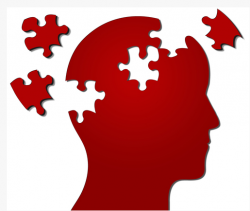I’ve always harbored a certain sense of suspicion about the scientific basis of Psychiatry. As early as in medical school I clashed with my psychiatry instructor. I wrote up a case of a patient with schizophrenia, and in the discussion section I opined that the basis of this perplexing disease has got to be a biochemical derangement in the brain. In my naivetè I didn’t realize the minefield I was stepping into. When I received back my write-up the discussion part was slashed with angry red lines and dripping sarcasm; “baseless!” and “nonsense!” she exclaimed.
I’ve always harbored a certain sense of suspicion about the scientific basis of Psychiatry. As early as in medical school I clashed with my psychiatry instructor. I wrote up a case of a patient with schizophrenia, and in the discussion section I opined that the basis of this perplexing disease has got to be a biochemical derangement in the brain. In my naivetè I didn’t realize the minefield I was stepping into. When I received back my write-up the discussion part was slashed with angry red lines and dripping sarcasm; “baseless!” and “nonsense!” she exclaimed. I later learned that the prevailing dogma de jour was that psychiatric illness is rooted in the environment. The blame lay with an abusive/distant/domineering mother, and if that didn’t fit, then an abusive/distant/domineering father would do just fine. This dogma, theology is probably closer to the truth, led to the extreme view of Thomas Szazs, an influential psychiatry professor in the 70s and 80s, who stated that schizophrenia is nothing but “difficulty in living”, a view which ironically led him to attack his own psychiatric profession. He labeled psychiatric diseases as “fake diseases”. Diagnoses of “mental illness” or “mental disorder” are passed off as “scientific categories” but they remain merely judgments (judgments of disdain) to support certain uses of power by psychiatric authorities, he stated with supreme certitude. Is there any wonder that Szasz was the darling of paranoid liberterians and the rebellious New Left of those days? Anybody daring to attribute mental illness to something structural or biochemical going awry in the brain was viewed as the equivalent of a religious heretic. Fortunately, burning at the stake went out of fashion by then.

In the meantime, science marched on, but fell victim to its own vulnerabilities. In the quest for antihypertensive drugs reserpine was discovered, and serendipitously it proved to be also an antidepressant. Now we know why: it depletes catecholamines, which include norepinephrine, serotonin, and dopamine, all neurotransmitters. A paper in a 1954 JAMA by the physicians who first tested reserpine in a clinical setting gushed “”reserpine will be the most important therapeutic development in the history of psychiatry.” So where is the pitfall in that assertion? In creating the mindset that psychiatric diseases are the consequences of “chemical imbalance” in the brain, and nothing else. This theory implicitly precluded other factors, such as faulty neuronal circuits or gross anatomical/physiological errors occurring during brain development. And the result? Relentless pursuit of inhibitors of serotonin reuptake, dopamine receptors and monoamine oxidase (catecholamine- depleting), all attempting to emulate the effects of reserpine. None of the new-fangled antipsychotic/antidepressant drugs were much of an improvement over the old drugs. For a reason look no further than the animal models used in psychiatric research and drug development. An article by the science writer Greg Miller in Science (p. 32, vol. 338, 2012) quotes Steven Hyman, director of the Stanley Center for Psychiatric Research at the Broad Institute, Cambridge, Massachussetts:
“In the “forced swim test,” for example, researchers put a rat or mouse in a tub of water and clock how long it takes for the animal to stop struggling and just float, as if it’s given up. “This is called behavioral despair,” Hyman says. Of course, nobody knows if the rat experiences anything like what a person in the grips of depression experiences, but rats given imipramine, one of the early antidepressants, struggle longer. The forced swim test has in fact identified other drugs that turn out to have antidepressant effects in humans, Hyman says, but by relying on a test designed to find imipramine-like effects, researchers may have missed drugs that work by means of other, potentially more effective mechanisms.” Not dissimilar to the drunk looking for his lost keys under a streetlight because that’s where the light is. But why complain? they did replace expiring patents and brought in billions in sales, a boon for industry if not for patients.
All that is so 20th century; enter the new neuroscience. New imaging methods, powerful new genetic tools, and consequently new animal models are unravelling the breathtaking complexity of the brain and astonishing diffuseness of brain areas involved in pathology. Take, for instance, new drugs targeting receptors for the neurotransmitter glutamate, which recent evidence suggests can reduce hopelessness and suicidal ideation in people with depression far faster than current drugs do. We are talking hours to few days, as opposed to weeks that the existing drugs take to show clinical effects. Or take deep brain stimulation (DBS), in which surgeons implant electrodes in brain regions thought to be involved in regulating emotion and cognition. The approach is still experimental, and only severely depressed patients who’ve failed to respond to less invasive treatments are eligible, but DBS seems to help about three-quarters of them, according to Helen Mayberg, a neurologist at Emory University in Atlanta and a pioneer of this therapy. The success of DBS, Mayberg and others suggest, undermines the decades-old concept of mental illness as primarily a chemical imbalance—too much or too little serotonin floating around the brain, for example—and points instead to faulty neural circuits as the core problem.
Quoting Cameron Carter, a cognitive neuroscientist at the University of California (UC), Davis:
“The delusions and hallucinations of schizophrenia, for example, may involve malfunctions in one network, while disordered thinking and other cognitive problems involve another. This brain-based view is at odds with the traditional approach of diagnosing disorders according to the behavioral problems and inner anguish they cause—the approach taken by psychiatry’s go-to diagnostic guide, the Diagnostic and Statistical Manual of Mental Disorders (DSM), published by the American Psychiatric Association. “There’s no doubt that these categories [in the DSM] don’t map very well onto nature.”
QED.
Whatever happened to the instructor who mounted such a merciless attack on a lowly medical student? She was removed from teaching the course the following year. And the student? He received an honors grade in Psychiatry. So there!
image: psychiatry/shutterstock
The post What’s Wrong with Psychiatry? appeared first on The Doctor Weighs In.









